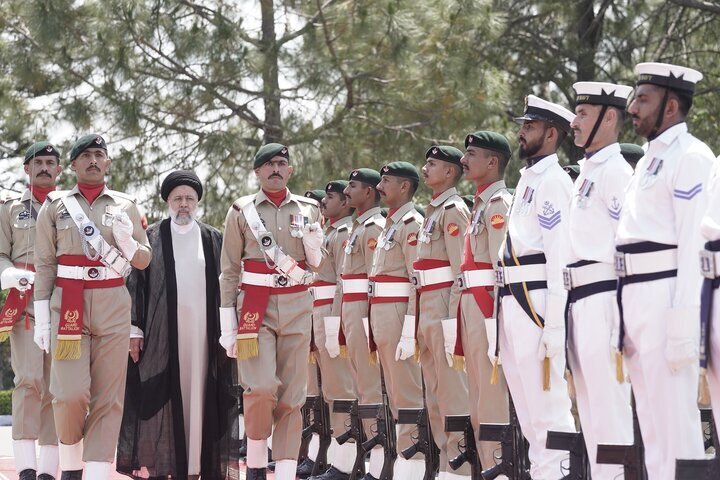Martyr Raisi’s final, historic visit to Pakistan despite strong U.S. opposition

ISLAMABAD – The mujahid scholar, servant of Imam Reza (peace be upon him), and devoted servant of the Islamic Ummah—Ayatollah Seyyed Ebrahim Raisi—passed away in a manner akin to martyrdom.
His death is not only a profound tragedy for the Iranian nation but also an immense and irreparable loss for the broader Islamic world.
Even a year later, the pain of his passing remains fresh. A son of the Islamic Revolution, Raisi dedicated his life to upholding the dignity of the Muslim Ummah, defending the oppressed, supporting the Palestinian cause, and standing by the weak and vulnerable. His sudden death left a profound sense of grief among freedom-seekers, anti-imperialists, and sincere people across the globe.
A missed hope for the people of Pakistan
Just a month before his tragic passing, Ayatollah Raisi made what would be his final and most historic visit to Pakistan—a trip analysts hailed as promising and full of potential. The visit was unique and memorable in many respects. During his stay, Raisi expressed a heartfelt wish to address the Pakistani public directly—a moment both he and the people eagerly anticipated, but which, tragically, never materialized.
On May 19, 2024, Ayatollah Raisi lost his life in a helicopter crash, leaving the people of Pakistan—who had been looking forward to hearing from him—deeply mourning. The visit had marked the beginning of a new chapter in Iran–Pakistan relations, with high-level discussions on bilateral cooperation, the Iran–Pakistan gas pipeline, and developments in West Asia.
His meetings with Pakistani officials—including President Asif Ali Zardari and Prime Minister Shehbaz Sharif—further solidified the foundation for strengthening bilateral ties.
Ayatollah Raisi’s martyrdom triggered an outpouring of sorrow and sympathy across Pakistan, a sentiment widely reflected on social media platforms where users recalled his heartfelt connection to the Pakistani people and the lasting impressions of his visit.
Though the trip lasted only two days, it was highly productive. His meetings with Pakistan’s political and military leadership and visits to various institutions left a deep and positive impact on bilateral relations.
Following Iran’s historic retaliatory strike on the Zionist regime, many Pakistani youth, elders, and even children were eager to meet the martyred president, hear his words, and express their admiration. It had long been customary for foreign leaders visiting Pakistan to deliver at least one public speech—often in Lahore.
When Leader of the Islamic Revolution Ayatollah Khamenei visited Pakistan during General Zia-ul-Haq’s rule as president of Iran, a historic and massive gathering welcomed him—an event comparable to the reception given to Imam Khomeini upon his return to Iran. Later, then-President Mohammad Khatami addressed the public during General Musharraf’s tenure, and even during President Hassan Rouhani’s visit under General Raheel Sharif’s military leadership—despite some tensions and signs of pro-American alignment—the tradition of public engagement continued.
During Raisi’s final visit, the Pakistani government faced both overt and behind-the-scenes pressure from the United States and Western powers. Yet the trip was conducted with dignity and success, marking a milestone in the history of bilateral relations.
Continuing his legacy through action
If the agreements signed during this visit are implemented with genuine political will, they would not only serve as a fitting tribute to the late president but also represent a continuation of his mission to deepen unity across the Muslim world.
The visit drew sharp reactions from the U.S. government and its regional allies—clear evidence that this was more than a routine diplomatic mission. Raisi’s presence in Pakistan signified a push for regional independence and resistance against foreign domination.
The blossoming of Iran–Pakistan relations: a glimpse ahead
Raisi’s three-day trip to Pakistan was his first foreign visit in the new Iranian calendar year and the first since Pakistan’s new government assumed office. The visit underscored the value Iran places on its “neighborhood-first” policy and opened new prospects for Iran–Pakistan cooperation.
Given their shared cultural, historical, and geographical bonds, Iran and Pakistan possess vast potential for cooperation in areas such as energy, border trade, communications, and security.
In the energy sector, collaboration on resource transfer and infrastructure development could significantly boost energy security in both countries. In the security domain, enhanced coordination to combat terrorism and address cross-border threats—especially considering Afghanistan’s unstable situation—has become an urgent necessity for both Tehran and Islamabad.
On a broader level, unity between Iran and Pakistan on major Islamic issues—particularly the defense of the Palestinian people against Zionist atrocities—can create a powerful front against global arrogance.
Foreign efforts to sow division and destabilize the region have only heightened the need for Tehran and Islamabad to maintain strong solidarity. Intelligence sharing, border coordination, and humanitarian and security cooperation—especially regarding Afghanistan—must remain key priorities.
In sum, strengthening Iran–Pakistan cooperation not only serves both nations’ interests but also contributes to the broader stability and development of the region.
During this historic visit, eight key memoranda of understanding were signed between Iran and Pakistan. One of the landmark achievements was an agreement to boost bilateral trade to \$10 billion—a revolutionary step toward deeper economic partnership.
The trip was not only a diplomatic success but also played a vital role in strengthening the emotional and spiritual bond between the brotherly Muslim nations of Iran and Pakistan.
May His Soul Rest in Peace. May His Memory Be Honored.
Leave a Comment